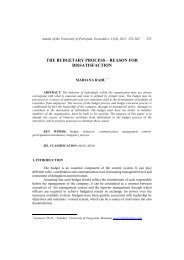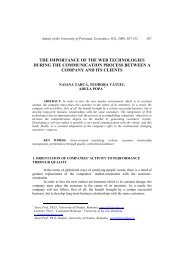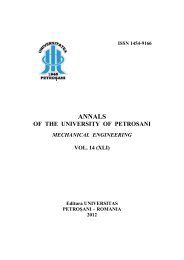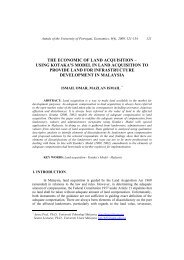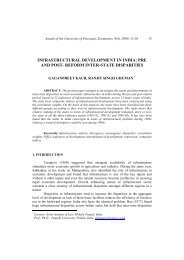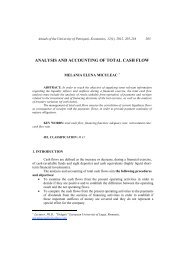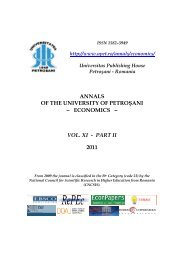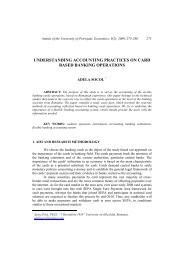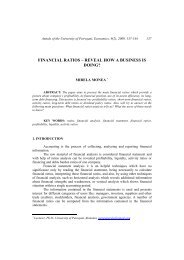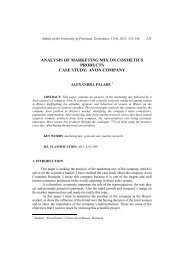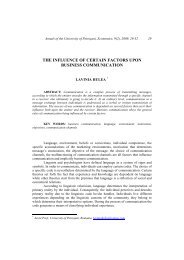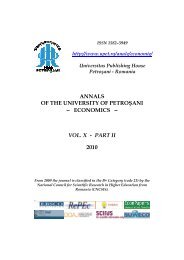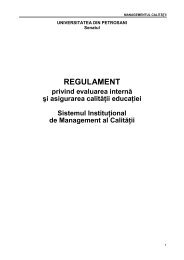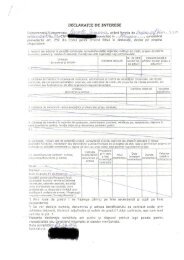annals of the university of petroÅani â¼ economics â¼ vol. xi - part i ...
annals of the university of petroÅani â¼ economics â¼ vol. xi - part i ...
annals of the university of petroÅani â¼ economics â¼ vol. xi - part i ...
Create successful ePaper yourself
Turn your PDF publications into a flip-book with our unique Google optimized e-Paper software.
34 Brezeanu, P.; Celea, S.; Stanciu, A.P.<br />
taxes, with an impact on <strong>the</strong>ir performance. Globalization <strong>of</strong> <strong>the</strong> corporate sector has<br />
favored <strong>the</strong> emergence <strong>the</strong> international dimension <strong>of</strong> tax evasion through international<br />
double taxation, <strong>the</strong> high heterogeneity manifested in <strong>the</strong> national tax regimes and thus<br />
different levels <strong>of</strong> fiscal pressure, which led to multiple opportunities for arbitrage. To<br />
evade tax, <strong>the</strong> taxpayer orients towards protected areas in fiscal terms. Gradually, <strong>the</strong>re<br />
have been drafted tax and financial engineering schemes by <strong>the</strong> intermediary <strong>of</strong> which<br />
various combinations that ground on fraudulent behaviors. Thus, a company can<br />
capitalize on arbitrage <strong>of</strong>fered by protected areas by declaring incomes as being made<br />
in ano<strong>the</strong>r country in <strong>the</strong> form <strong>of</strong> billing by <strong>the</strong> parent company or subsidiary; transfer<br />
pricing mechanism is a modality for acts <strong>of</strong> tax evasion to take shape. Frequent<br />
manifestations <strong>of</strong> this kind have led to <strong>the</strong> need to exercise strict fiscal controls in <strong>the</strong><br />
group consolidated financial statements <strong>of</strong> companies, <strong>part</strong>icularly in light <strong>of</strong> <strong>the</strong> origin<br />
<strong>of</strong> declared income and tax regime applicable to <strong>the</strong>m.<br />
International tax evasion has developed in <strong>the</strong> context <strong>of</strong> directing excessive<br />
investment flows to emerging countries. In order to ensure that foreign direct<br />
investment act as an engine <strong>of</strong> economic growth, emerging countries have used, in<br />
addition to low labor cost, low tax advantage, by <strong>of</strong>fering incentives to foreign<br />
investors. Recently, many studies have been channeled towards <strong>the</strong> tax advantages that<br />
support absolutely artificial, inconsistent devices to attract foreign investors. In<br />
general, <strong>the</strong> analysis revealed that foreign investment directed only under <strong>the</strong> tax<br />
advantages do not ensure economic solid growth, <strong>the</strong>ir character being temporary.<br />
2. FORMS OF FISCAL EVASION<br />
At <strong>the</strong> international level, <strong>the</strong>re can be remarked multiple financial engineering<br />
schemes which reflect a high degree <strong>of</strong> creativity as for <strong>the</strong> combination <strong>of</strong> various<br />
elements in order to obtain fiscal advantages. The most frequent forms <strong>of</strong> fiscal evasion<br />
consist <strong>of</strong> abstinence and concealment; <strong>the</strong>y represent, in essence, <strong>the</strong> grounds for <strong>the</strong><br />
o<strong>the</strong>r forms <strong>of</strong> fiscal evasion. In case <strong>of</strong> <strong>the</strong> abstinence, <strong>the</strong> tax payer, discouraged by a<br />
high fiscal rate, is oriented towards an area with a low fiscal rate, and decides <strong>the</strong><br />
cessation <strong>of</strong> any activity that could be subject to fiscal burden in his origin country. In<br />
comparison with <strong>the</strong> corporate sector, <strong>the</strong> mo<strong>the</strong>r company located in a country with a<br />
high fiscal burden will advise its subsidiaries to avoid dividend distribution, which<br />
will protect <strong>the</strong> pr<strong>of</strong>it accumulation. Concealment implies hiding <strong>the</strong> real revenues or<br />
disclosing <strong>the</strong>m in an imprecise manner in order to elude fiscal rules.<br />
While abstinence is related to <strong>the</strong> concept <strong>of</strong> lawful tax evasion, made under<br />
<strong>the</strong> protection <strong>of</strong> relocation or transfer pricing, risk concealment in<strong>vol</strong>ves a higher tax<br />
evasion since evasion tends to become illegal. In general, international tax fraud is<br />
materialized through <strong>the</strong> following techniques: directing pr<strong>of</strong>its to a country with low<br />
rates <strong>of</strong> taxation through transfer pricing; non-repatriation <strong>of</strong> income earned abroad by<br />
implementing reward support systems. Techniques are supported by different<br />
organizational schemes such as holding companies, mo<strong>the</strong>r companies and fictitious<br />
companies. Located in countries such as Lichtenstein, Luxembourg or Bermuda,<br />
holdings boast a multitude <strong>of</strong> functions. They are specialized in portfolio management,



